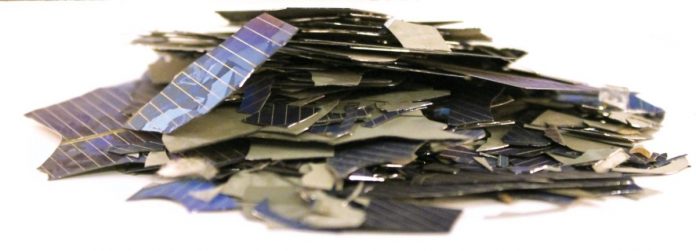Solar panel waste in the United States may reach the weight of 30 Empire State Buildings, or 10 million metric tons, by 2050, according to the National Renewable Energy Laboratory (NREL). Currently, it is cheaper to toss a panel in the landfill than to reuse or recycle it. But, as the stack of decommissioned panels grows, so too does the opportunity for a circular economy.
The creators of the newly launched SolarRecycle.org recognized this opportunity, and are working to support the flow of information to enable greater rates of solar panel reuse and recycling.
Recycling incentives are poorly aligned at present, but this dynamic appear to be shifting. For example, analysts at NREL have modeled a current average recycling cost of $28 per module, repairs at $65 per module, and landfilling at only $1.38 per module.
Solar panel recycler Cascade Eco Minerals (CEM) told pv magazine that the market has pushed recycling costs down as more panels reach the end of their serviceable lives. It said that the current rate is about $0.35 per pound. That mean a typical 72-cell module weighing 50 lbs. would cost roughly $17.50 to recycle. The company said much of this cost reduction has occurred in the last 12-18 months, and rising economies of scale should continue to shrink costs.
Recycling rates are low right now, but declining costs could lead to a better financial model. NREL said at a $28 price tag, decision-makers would likely landfill their panels at a rate of 80% through 2050. If costs fell to $18 per module, closer to the figure quoted by CEM, recycling rates would increase by about one-third.
SolarRecycle said it aims to speed this maturation process for the solar panel recycling economy by connecting asset owners, operations and maintenance providers, and other players with recycling vendors.

NREL’s circular economy model.
Image: NREL
The new website aggregates information on where to donate or sell used equipment, how to recycle, and provides updated state and federal policy related to solar recycling and waste classification. An interactive map highlights service providers by state.
“How many solar companies have piles of used and broken equipment in their warehouse? This website can help connect you with options to sell, donate, or recycle those items and free up your space – and your conscience,” said Kate Collardson, a volunteer with SolarRecycle.org.
As solar panel recycling is still in an early stage, so is SolarRecycle.org. The website-runners said they hope others will add to the site in order to centralize research and resource access.






